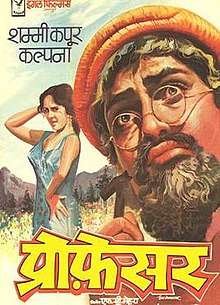Professor (1962 film)
Professor is a 1962 Hindi film, produced by F. C. Mehra and directed by Lekh Tandon.[2] The film stars Shammi Kapoor, Kalpana, Bela Bose, Lalita Pawar, Tun Tun and Iftekhar. The film's music is by Shankar Jaikishan. The film became a box office hit.[3] The film was remade in Tamil as Nadigan (1990), in Telugu twice as Bhale Mastaru (1969), Peddinti Alludu (1991) and in Kannada as Gopi Krishna.[4] The rights to this film are owned by Shah Rukh Khan's Red Chillies Entertainment.
| Professor | |
|---|---|
 | |
| Directed by | Lekh Tandon |
| Produced by | F. C. Mehra |
| Written by | Abrar Alvi[1] |
| Starring | Shammi Kapoor Kalpana Mohan Lalita Pawar |
| Music by | Shankar Jaikishan |
| Cinematography | Dwarak Divecha |
| Edited by | Pran Mehra |
Release date | 11th May 1962 |
| Country | India |
| Language | Hindi |
Plot
Sita Devi Verma (Lalita Pawar), situated in Darjeeling[5] is the guardian to two young women (Nina and Rita) and two school children (Bunty and Munnu) in her care. She is a strict guardian and the four often disobey her and create mischief behind her back. She is looking for a professor as a tutor, her only condition being that he should be above 50 years of age. Pritam Khanna (Shammi Kapoor), a young college graduate in dire need of work, applies for the job and get dejected after being rejected due to his age. The same day, he discovers his mother (Pratima Devi) has an advanced stage of tuberculosis and needs hospitalization. Due to financial difficulties, he disguises himself as an older professor and takes the job.
The women do not want a professor and try every trick in the book to defame the professor in the eyes of Sita Devi. Pritam soon catches on and defeats them at their own game. He falls in love with Nina and woos her as a young man in the city. Chaos ensues when Sita Devi develops feelings towards old Prof. Khanna and Pritam has to romance the two ladies in different disguises at the same time.
Cast
- Shammi Kapoor...Professor Pritam Khanna
- Salim Khan...Ramesh
- Kalpana...Neena Verma
- Lalita Pawar...Sita Devi Verma
- Parveen Choudhary...Rita Verma
- Pratima Devi...Mrs. Khanna
- Rashid Khan...Hanuman Singh
- Bela Bose...Mrs. Singh
- Tun Tun...Phool Rani
- Iftekhar...Artist
Soundtrack
All the songs were composed by Shankar Jaikishan.
| # | Title | Singer(s) | Lyricist | Duration | Note |
|---|---|---|---|---|---|
| 1 | Koi Ayega | Lata Mangeshkar, Asha Bhosle | Shailendra | 03:16 | Picturised on Kalpana and Parveen Choudhary |
| 2 | Yeh Umar Hai | Asha Bhosle, Usha Mangeshkar, Manna Dey | Hasrat Jaipuri | 03:26 | Picturised on Shammi Kapoor, Kalpana and Parveen Choudhary |
| 3 | Main Chali Main Chali | Mohammad Rafi, Lata Mangeshkar | Shailendra | 03:03 | Picturised on Shammi Kapoor, Kalpana |
| 4 | Aye Gulbadan | Mohammad Rafi | Hasrat Jaipuri | 03:18 | Picturised on Shammi Kapoor, Kalpana |
| 5 | Khuli Palak Mein Jhoota Gussa | Mohammad Rafi | Shailendra | 03:06 | Picturised on Shammi Kapoor, Kalpana |
| 6 | Aawaz Deke Humein Tum Bulao | Mohammad Rafi, Lata Mangeshkar | Hasrat Jaipuri | 03:08 | Picturised on Shammi Kapoor, Kalpana |
Awards and nominations
- Won: Filmfare Best Music Director Award - Shankar Jaikishan
- Nominated: Filmfare Award for Best Actor - Shammi Kapoor
- Nominated: Filmfare Award for Best Supporting Actress - Lalita Pawar
- Nominated: Filmfare Award for Best Lyricist - Hasrat Jaipuri for the song "Aye Gulbadan"
- Nominated: Filmfare Award for Best Male Playback Singer - Mohammed Rafi for the song "Aye Gulbadan"[6]
References
- Alvi's fees (Rs 17,500) were less than half his market rate at that time, due to producer Mehra's hiring of Lekh Tandon as director. Abrar Alvi with Sathya Saran, Ten Years with Guru Dutt: Abrar Alvi's Journey (New Delhi: Penguin Books India, 2008), 82-84. ISBN 067008221X
- According to writers such as Deepa Gahlot, director Lekh Tandon's casting of Shah Rukh Khan in his serial Dil Dariya (1988-89) constituted the discovery of SRK. Deepa Gahlot, Take-2: 50 Films That Deserve a New Audience (Carlsbad CA: Hay House, Inc, 2015), 139. ISBN 938454485X
- "Archived copy". Archived from the original on 15 July 2012. Retrieved 9 February 2008.CS1 maint: archived copy as title (link)
- Chatterji, Shoma A (19 October 2017). "Lekh Tandon". Upperstall.com. Retrieved 20 April 2018.
- While filming in Darjeeling, the Professor crew and cast's work came slowly, due to the regular appearance of mist, which would make the shots less clear than the shiny cinematography of this kind of masala film demanded. Dwarka Divecha, who was also the director of photography for such greats as Sholay (1975), was the cameraman for Professor. Shoma A. Chatterji, Filming Reality: The Independent Documentary Movement in India (New Delhi: SAGE India, 2015), 42. ISBN 9351502880
- http://deep750.googlepages.com/FilmfareAwards.pdf